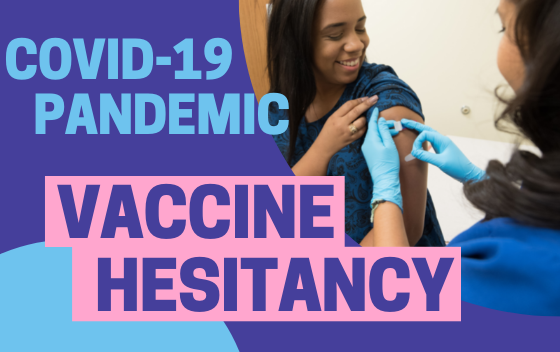As a public health scientist, I trust science. As a Black American woman in the U.S., I also understand the hesitancy in receiving the vaccine particularly among Black Americans, which is a manifestation of a deeper mistrust of in the health care system in the U.S. I first recognize that these layers of concerns and mistrust are valid, considering a history of institutional racism and medical abuse of Black bodies within this country, with unethical medical studies and procedures including the Tuskegee Experiment, Henrietta Lacks, and the inhumane experimentation conducted on enslaved Black women by physician, Marion Sims, amongst other historical and current events. While acknowledging these concerns, I would also like to take the opportunity to address a few myths and concerns about the COVID-19 vaccine.
“The vaccine was developed too quickly.”
According to Pew Research Center, 61% of Black Americans say they will definitely or probably get a COVID-19 vaccine. Among the nearly 40% of Black Americans who say they do not plan to get the COVID-19 vaccine, 74% say a major reason is that the vaccines were developed and tested too quickly.
Foremost, it is important to understand that the COVID-19 vaccine underwent the same rigorous testing and processes that other vaccines have undergone in our country. Vaccines undergo three phases of clinical trials. During the development of the COVID-19 vaccines, phases have overlapped so the vaccine could be used quickly to control the pandemic. There were no corners cut in developing and testing the vaccine and no phases were skipped in the process either.
In addition, the virus that causes COVID-19 is related to other coronaviruses that cause diseases such as SARS. Scientists have decades of coronavirus research, which was used to accelerate the development of the current COVID-19 vaccines. My brother shared a great analogy. Consider baking a cake. We have known how to bake cakes for centuries. The basic ingredients to baking a cake are the same. If you are a baker, or even familiar with baking cakes, you probably know the basic ingredients by memory. Now as you develop specific cakes, like red velvet or pineapple upside down cake, you add additional ingredients or even tweak the foundational ingredients for the specific type of cake you are baking. However, the blueprint, similar to the blueprint available for making coronavirus vaccines, remains the same. Having a blueprint helps to streamline the process because essentially you do not have to start from scratch.
Concerns Over Vaccine Side Effects
After receiving the first dose of the vaccine at a mass vaccination site in Atlanta, I waited the recommended 15 minutes for additional observation in case of allergic reaction. For the rest of the day, I experienced a mild soreness in my arm. The soreness was more intense on the second day but subsided by the end of the day. The pain I experienced was minor in comparison of the importance of getting the vaccine and the protection it provides, however. Other possible side effects include fever, chills, headaches, and tiredness. The side effects after the second dose of the COVID-19 vaccine may be more intense. Of note, there have only been a very small percentage of individuals identified with severe allergic reactions, i.e., 4.5 cases per million doses administered.
The COVID-19 vaccine will not change your DNA.
The Pfizer and Moderna vaccines are messenger RNA, or mRNA vaccines. They teach our cells how to make a protein that triggers an immune response. Our DNA is housed in the nucleus of our cells. The mRNA from a COVID-19 vaccine does not enter the nucleus of the cell. Therefore, in no way can or does the mRNA affect or interact with our DNA. You can learn more about how mRNA vaccine work here.
Importance of COVID-19 vaccination among African Americans
Statistically, African-Americans continue to contract the COVID-19 virus at higher rates and have experienced higher rates of severe complications and deaths from the virus as well. The COVID-19 vaccines are safe and highly effective, are a critical step in achieving herd immunity, and an important step in protecting us against contracting the virus as well. Of note, at this time, the vaccine is not available for smaller children. However, in studies with breastfeeding mothers, vaccinated mothers were found to have COVID-19 antibodies in their breast milk. Among mothers who are nursing, this provides an opportunity to provide protection against the COVID-19 virus to their babies, in addition to the myriad of other breastfeeding benefits.
I am looking forward to receiving my second dose of the COVID-19 vaccine in the coming week. I hope in reading this article, you have a clearer understanding of the science and the importance of receiving the COVID-19 vaccine as well. Whatever you decide, I pray you take an opportunity to delve deeper into the science, to seek trusted sources of information, and most importantly to lean into your faith and trust in God in making your decision.
By: Sister Ayanna Robinson, PHD, MPH


